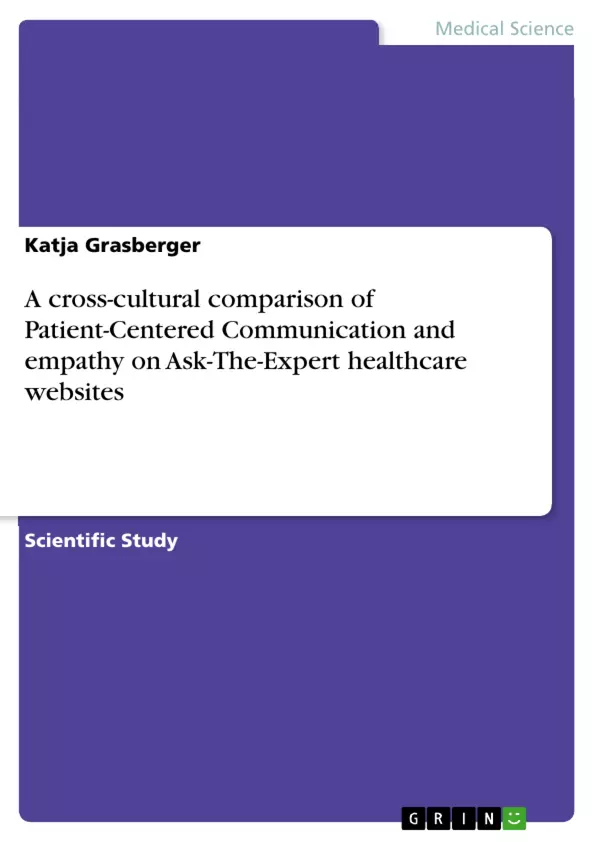This work investigates whether online healthcare experts from Germany and the UK make use of empathy and Patient-Centered Communication (PCC) in their expert responses to online patients struggling with depression. The work primarily focuses on cross-cultural differences and similarities for which a discourse-analytical approach is used in order to analyse relevant communicative strategies. Based on the findings, the author aims to deduce possible implications and questions whether cultural awareness is needed in online Ask-The-Expert healthcare contexts. The author claims that empathy and PCC is used differently in the online healthcare context in Germany and the UK.
Ask-The-Expert advice-giving websites and forums have become common in the World Wide Web to provide users with lay person or expert opinions and support on specific topics. Online health support and intervention has become particularly popular.
Studies have provided evidence that the usage of empathy in clinical consultations can increase patient satisfaction, adherence to treatment plans and recovery rates. It is especially patients with psychosocial problems that have been found to be more likely to want and expect PCC in medical consultations. While it is widely accepted that empathy and PCC is key to successful medical face-to-face consultations, some research has suggested that emphatic communicative strategies are harder to achieve in online communication. It has even been suggested that empathy and PCC might not be deemed important by either the online expert or the patient.
Inhaltsverzeichnis (Table of Contents)
- 1. Introduction
- 2. Theoretical Background
- 3. Methodology
- 3.1. Data
- 3.2. Data Collection Procedure
- 3.3. Coding Scheme
- 4. Results
- 4.1. Realization of PPC and Empathy
- 4.2. Cross-cultural comparison
- 5. Discussion
- 6. Conclusion
Zielsetzung und Themenschwerpunkte (Objectives and Key Themes)
This study aims to investigate the use of empathy and patient-centered communication (PCC) in online healthcare advice contexts, specifically focusing on cross-cultural differences between Germany and the UK. The study analyzes expert responses to online patients seeking help for depression, utilizing a discourse-analytical approach to identify relevant communicative strategies.
- Cross-cultural comparison of empathy and PCC in online healthcare contexts
- Analysis of communicative strategies employed by healthcare experts
- The impact of cultural awareness on online healthcare communication
- Exploring the role of empathy and PCC in online healthcare advice
- Potential implications for online patient-expert interactions
Zusammenfassung der Kapitel (Chapter Summaries)
- Chapter 1: Introduction introduces the study's focus on empathy and PCC in online healthcare, highlighting the growing use of online health services and the need for further research on their communication dynamics.
- Chapter 2: Theoretical Background examines the concepts of advice-giving and its cultural variations, emphasizing the potential for advice to be perceived as threatening in certain contexts. It then delves into the importance of establishing common ground between healthcare experts and patients, both online and offline.
- Chapter 3: Methodology outlines the data collection and analysis procedures employed in the study. This chapter details the specific data sources, the collection process, and the coding scheme used to analyze the communication patterns.
- Chapter 4: Results presents the findings of the study, focusing on the realization of PCC and empathy in the online healthcare context and their cross-cultural variations.
Schlüsselwörter (Keywords)
The main keywords and focus topics of this study include: patient-centered communication, empathy, online healthcare, cross-cultural communication, discourse analysis, depression, healthcare advice, online forums, cultural awareness, Germany, UK.
Frequently Asked Questions
What is the main goal of this cross-cultural comparison?
The study investigates how online healthcare experts in Germany and the UK use empathy and Patient-Centered Communication (PCC) when responding to patients with depression.
What is Patient-Centered Communication (PCC)?
PCC is a communication style that prioritizes the patient's perspectives, needs, and values, and is considered key to successful medical consultations.
Why focus on online depression forums?
Patients with psychosocial problems are more likely to expect PCC, making depression forums a relevant context for analyzing empathetic communicative strategies.
What methodology is used to analyze the expert responses?
A discourse-analytical approach is used to identify and compare communicative strategies in Germany and the UK.
Does cultural awareness matter in online healthcare?
Yes, the author claims that empathy and PCC are used differently across cultures, suggesting that cultural awareness is necessary for effective online expert-patient interactions.
- Quote paper
- Katja Grasberger (Author), 2018, A cross-cultural comparison of Patient-Centered Communication and empathy on Ask-The-Expert healthcare websites, Munich, GRIN Verlag, https://www.grin.com/document/497956



